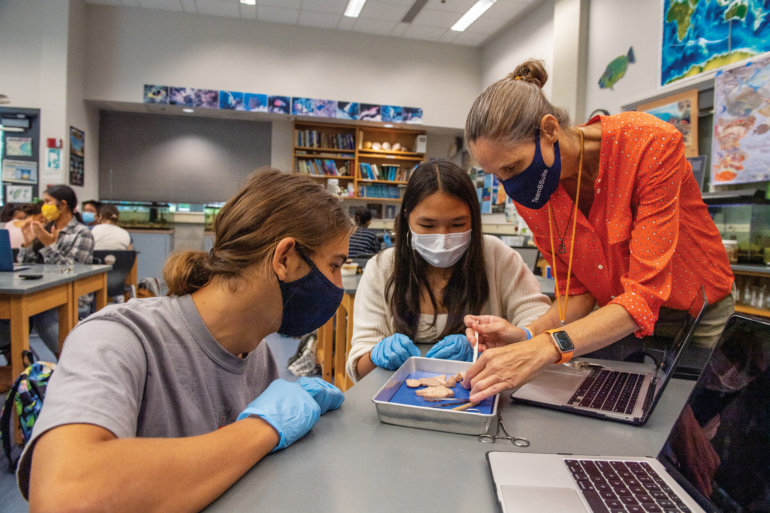There is a shared sense that some profound learning took place during the radical disruption of the pandemic – learning that can make our schools emerge stronger. That is, if we pause and take stock of what we learned and commit ourselves to habituating and solidifying new practices and recommit to deepening practices in better alignment with our core values.
– From the report, “What Exactly Did the Pandemic Teach Educators?”
Last spring, as the school year disrupted by COVID-19 was winding down, Punahou organized small, voluntary focus groups that nearly all Academy faculty attended. The goal – to capture the thoughts and experiences of teachers to extract lessons learned during the pandemic.
It was essential to document what faculty learned, along with what they hope to continue post-COVID-19, Assistant Academy Principal Sally Mingarelli said. All of this was included in the report, “What Exactly Did the Pandemic Teach Educators?”
The report identified 10 core themes from the faculty conversations. The top theme was the importance for teachers to build strong relationships with students and foster a supportive School community.
“Instead of getting to know your students slowly over the course of a semester, there has been a commitment to get to know kids early in the semester, so that you have this foundational relationship of trust and empathy,” Mingarelli said. “It’s so important for our students’ mental health and
well-being, but also for their deep learning.”
The pandemic also furthered the adoption of technology, with faculty seeing how beneficial it can be both during distance learning and when on campus. For instance, Academy faculty were already using Canvas – an online educational management platform – but it became fully integrated after COVID-19.
“Faculty members became experts at Canvas and used it as a place to put asynchronous learning opportunities – videos, assignments and quizzes,” Mingarelli said. “They really leaned into that tool, as they realized some things are better done asynchronously and that using an online management system is how you can do that.
What Academy Faculty Learned – Top Themes
- Importance of relationships and
community building - Maximizing the efficacy of online tools
- Need for cognitive engagement
- Importance of flexibility and empathy
- Practices informed by the design values for learning
- Maximizing in-person learning
- Self-care and wellness for both students and adults
- Value of personalized instruction
- Teachers are also learners
- Ensuring relevance of curriculum
What the teachers said:
“I realized I need to be more gracious, and just encourage them. More of ‘Is there anything I can do to help you?’ and not make it about my deadlines, but make it about them, because I know they want to get their assignments in. I know they want to do a good job. So how do I allow that to happen?”
– Science teacher
“I think that I just deepened my commitment to making sure every kid knew that they were cared for and that I got to know them.”
– PE teacher
“This year wasn’t just about finding new ways to do old things; it was about finding new ways to do new things.”
– Language teacher
“What everyone did was look at our curriculum and weed out what’s really not important and really focus on what was most important.”
– PE teacher
“I had a focus on just getting them to make things that are meaningful for them.”
– Design Technology
teacher
“I’ve been looking at the whole student, because so much of the performance of a lot of the students has been affected by their emotional well-being.”
– Math teacher
“I created more space and time for students to be people – to express themselves and connect with each other.”
– English teacher
“This year reinforced just how important it is to understand where the student is coming from and develop trust.”
– Social Studies teacher

